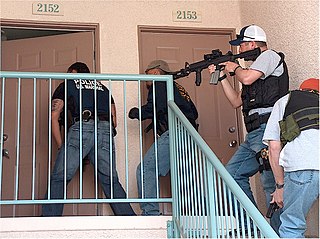Related Research Articles

The Fourth Amendment to the United States Constitution is part of the Bill of Rights. It prohibits unreasonable searches and seizures and sets requirements for issuing warrants: warrants must be issued by a judge or magistrate, justified by probable cause, supported by oath or affirmation, and must particularly describe the place to be searched and the persons or things to be seized.
A search warrant is a court order that a magistrate or judge issues to authorize law enforcement officers to conduct a search of a person, location, or vehicle for evidence of a crime and to confiscate any evidence they find. In most countries, a search warrant cannot be issued in aid of civil process.
Mapp v. Ohio, 367 U.S. 643 (1961), was a landmark decision of the U.S. Supreme Court in which the Court ruled that the exclusionary rule, which prevents prosecutors from using evidence in court that was obtained by violating the 4th Amendment to the U.S. Constitution, applies not only to the federal government but also to the state governments. The Supreme Court accomplished this by use of a principle known as selective incorporation.

Search and seizure is a procedure used in many civil law and common law legal systems by which police or other authorities and their agents, who, suspecting that a crime has been committed, commence a search of a person's property and confiscate any relevant evidence found in connection to the crime.
In criminal procedure law of the United States, an exigent circumstance allows law enforcement to enter a structure without a search warrant, or if they have a "knock and announce" warrant, allows them to enter without knocking and waiting for the owner's permission to enter. It must be a situation where people are in imminent danger, evidence faces imminent destruction, or a suspect's escape is imminent. Once entry is obtained, the plain view doctrine applies, allowing the seizure of any evidence or contraband discovered in the course of actions consequent upon the exigent circumstances.
In United States constitutional law and criminal procedure, the good-faith exception is one of the limitations on the exclusionary rule of the Fourth Amendment.

Knock-and-announce, in United States law criminal procedure, is an ancient common law principle, incorporated into the Fourth Amendment, which requires law enforcement officers to announce their presence and provide residents with an opportunity to open the door prior to a search.
Cory Jermaine Maye is a former American prisoner. He was originally convicted of murder in the 2001 death of Prentiss, Mississippi, police officer Ron W. Jones, during a drug raid on the other half of Maye's duplex.
Georgia v. Randolph, 547 U.S. 103 (2006), is a case in which the U.S. Supreme Court held that without a search warrant, police had no constitutional right to search a house where one resident consents to the search while another resident objects. The Court distinguished this case from the "co-occupant consent rule" established in United States v. Matlock, 415 U.S. 164 (1974), which permitted one resident to consent in absence of the co-occupant.
Hudson v. Michigan, 547 U.S. 586 (2006), is a United States Supreme Court case in which the Court held that a violation of the Fourth Amendment requirement that police officers knock, announce their presence, and wait a reasonable amount of time before entering a private residence does not require suppression of the evidence obtained in the ensuing search.
Consent searches are searches conducted by United States law enforcement after obtaining the voluntary consent of the person being investigated. In some cases, consent may also be obtained from certain third-parties. Searches that are the product of consent are one of several recognized exceptions to the warrant requirement of the Fourth Amendment to the United States Constitution. The prosecution bears the burden of proving that consent was freely and voluntarily given. Courts look to the totality of the circumstances to determine whether consent was freely and voluntarily given.
In the United States, a no-knock warrant is a warrant issued by a judge that allows law enforcement to enter a property without immediate prior notification of the residents, such as by knocking or ringing a doorbell. In most cases, law enforcement will identify themselves just before they forcefully enter the property. It is issued under the belief that any evidence they hope to find may be destroyed between the time that police identify themselves and the time they secure the area, or in the event where there is a large perceived threat to officer safety during the execution of the warrant.
Wilson v. Arkansas, 514 U.S. 927 (1995), is a United States Supreme Court decision in which the Court held that the traditional, common-law-derived "knock and announce" rule for executing search warrants must be incorporated into the "reasonableness" analysis of whether the actual execution of the warrant is/was justified under the 4th Amendment. The high court thus ruled that the old "knock and announce" rule while not a hard requirement, was also not a dead letter.
Kentucky v. King, 563 U.S. 452 (2011), was a decision by the US Supreme Court, which held that warrantless searches conducted in police-created exigent circumstances do not violate the Fourth Amendment as long as the police did not create the exigency by violating or threatening to violate the Fourth Amendment.

Florida v. Jardines, 569 U.S. 1 (2013), was a United States Supreme Court case which resulted in the decision that police use of a trained detection dog to sniff for narcotics on the front porch of a private home is a "search" within the meaning of the Fourth Amendment to the United States Constitution, and therefore, without consent, requires both probable cause and a search warrant.
Steagald v. United States, 451 U.S. 204 (1981), is a United States Supreme Court case which held that, based on the Fourth Amendment, a police officer may not conduct a warrantless search of a third party's home in an attempt to apprehend the subject of an arrest warrant, absent consent or exigent circumstances.
Maryland v. King, 569 U.S. 435 (2013), was a decision of the United States Supreme Court which held that a cheek swab of an arrestee's DNA is comparable to fingerprinting and therefore, a legal police booking procedure that is reasonable under the Fourth Amendment.
United States v. Watson, 423 U.S. 411 (1976), was a case decided by the Supreme Court of the United States that decided that a warrantless arrest in public and consenting to a vehicle search did not violate the Fourth Amendment.
Johnson v. United States, 333 U.S. 10 (1948), was a significant United States Supreme Court decision addressing search warrants and the Fourth Amendment. In this case, where federal agents had probable cause to search a hotel room but did not obtain a warrant, the Court declared the search was "unreasonable."
Caniglia v. Strom, 593 U.S. ___ (2021), was a United States Supreme Court case related to the Fourth Amendment to the United States Constitution's "community caretaking" exception.
References
- 1 2 3 4 Holcomb, Jayne (August 2006). "Knock and Talks". FBI Law Enforcement Bulletin. 75 (8): 22–32. Retrieved 2014-11-15.
- ↑ "State v. Dwyer". Kansas Judicial Branch. Kansas Judicial Center. December 8, 2000. Retrieved June 18, 2014.
- ↑ "The "knock and talk" tactic is held to be constitutional" (PDF). Legal Update. 6 (9). Michigan State Police Training Division: 1–2. November 2001. Retrieved June 18, 2014.
- ↑ "Kentucky v. King".